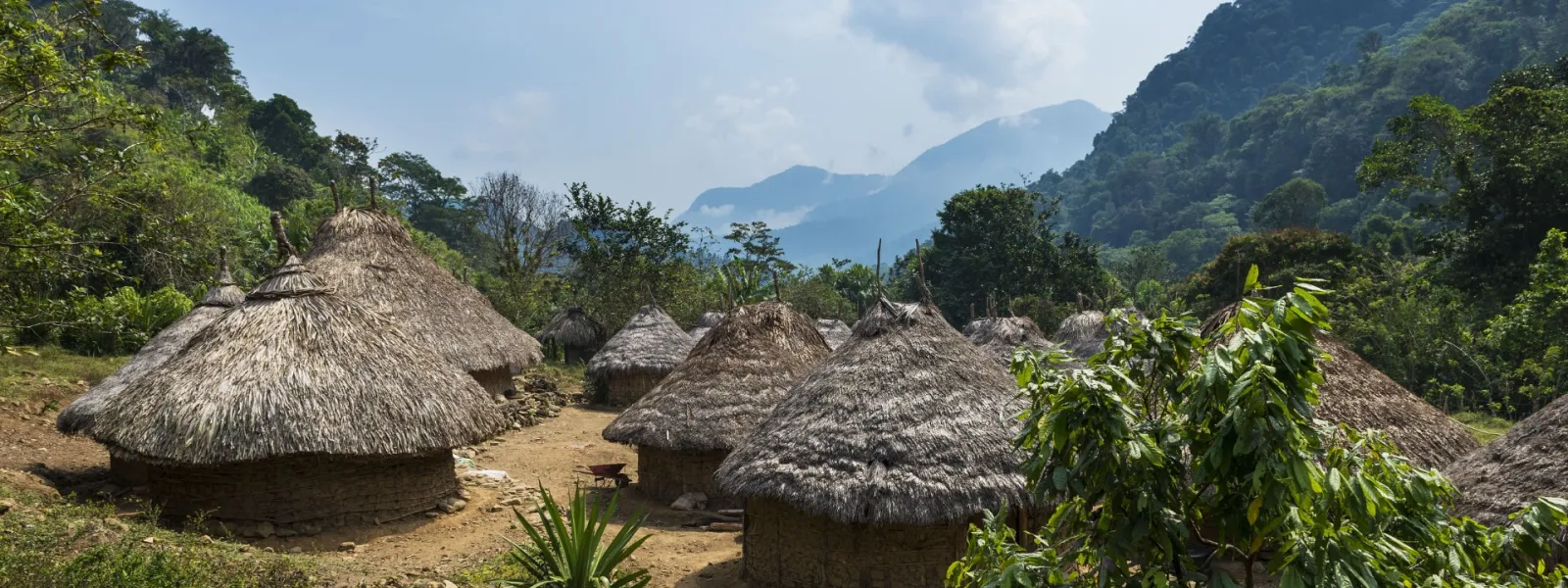
Project
Preserving the legacy of the Sierra Nevada de Santa Marta, Heart of the World
Rising abruptly from Colombia’s Caribbean coast, the Sierra Nevada de Santa Marta reaches 5,775 meters (18,946 ft.) at its highest points, the peaks of Bolívar and Colón. It is the highest coastal mountain system in the world, a place where indigenous knowledge and nature’s own wisdom converge.
The sheer changes in elevation create a wide variety of ecosystems within a small area, where the diversity of plant and animal life creates a unique exuberant region. The melting snows of the highest peaks form rivers and lakes, whose freshwater flows down steep slopes to the tropical sea at the base of the mountains.
The indigenous Arhuaco, Kogi, Wiwa, and Kankuamo people protect and care for this natural treasure with an authority they have inherited from their ancestors. According to their worldview the land is sacred and shared in divine communion between humans, animals, plants, rivers, mountains, and the spirts of their ancestors.
Despite this ancestral inheritance, development projects proposed for the region have failed to take the opinions of these indigenous groups into consideration. The Sierra Nevada de Santa Marta is currently threatened by 251 mineral concessions, hydroelectric projects, agriculture, urban sprawl, and infrastructure projects.
Many of these concessions were granted without the prior consultation of the indigenous communities, which represents a persistent and systematic violation of their rights.
Mining, which implies the contamination and erosion of watersheds, threatens the health of more than 30 rivers that flow out of the Sierra; these are the water sources of the departments of Magdalena, César, and La Guajira.
These threats have brought this natural paradise to the brink of no return. With it, would go the traditional lives of its indigenous inhabitants, who are dependent on the health of their land and the sacred sites it contains.
The Sierra hosts the archaeological site of la Ciudad Perdida, the Lost City, known as Teyuna, the cradle of Tayrona civilization. According to tradition, it is the source from which all nature was born—the living heart of the world.
The four guardian cultures of the Sierra are uninterested in allowing this natural and cultural legacy to disappear.
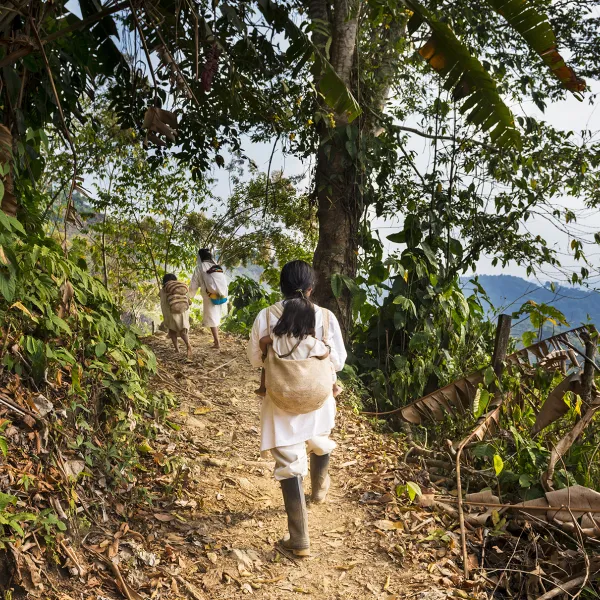
Related projects
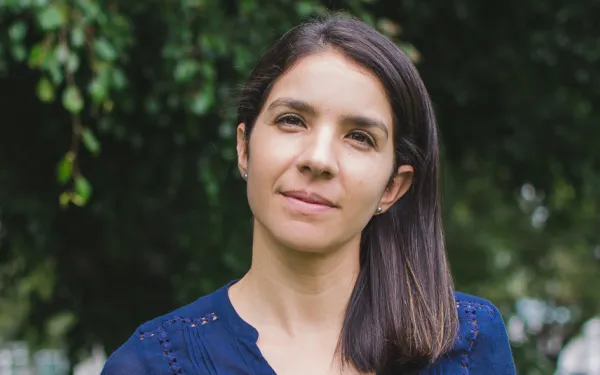
Gladys Martínez, Executive Director of AIDA
After a rigorous recruitment process spearheaded by AIDA’s Board of Directors, Gladys Martínez de Lemos has accepted the position of AIDA Executive Director, effective immediately. Gladys Martínez has a long trajectory with AIDA, having helped to build and strengthen the organization for the past 15 years. She is recognized as a positive, empathetic, and dynamic leader who believes deeply in AIDA, and encourages the team’s professional and personal growth. Throughout the recruitment process, entrusted to an independent search firm and involving a committee of representatives from the Board and AIDA team, Gladys proved herself to be the most qualified candidate for the position. For the past eight years, Gladys has led AIDA’s Marine Biodiversity and Coastal Protection Program, overseeing its growth into a multidisciplinary team of attorneys and scientists advocating for species and ecosystem preservation, responsible management practices, and the protection of coastal communities. She has represented AIDA before international negotiating bodies, championed relationships with governments, and grown alliances with organizations and advocates across the Americas. Gladys has a law degree from the University of Costa Rica and a master's degree in Environmental Security and Peace from the United Nations University for Peace. Most recently, she became a Kellog Executive Scholar in Nonprofit Management through Northwestern University's Kellogg School of Management. "My journey with AIDA has been a great adventure for the defense of the people and natural places of Latin America," she said. "Important parts of my heart and mind were formed here at this organization and, now, I’m honored to have the opportunity to lead it into its next stage. Supported by my experience and the tools I’ve acquired in recent years, I’m looking forward to maximizing the talents of AIDA’s team and, together, advancing our efforts for environmental and climate justice on the continent.” This executive leadership transition represents an important organizational evolution as AIDA shifts to a single executive director model following the departure of former co-director Astrid Puentes Riaño. In the new structure, the Board has named former co-director Anna Cederstav Chief Financial Officer. Anna will also serve as Deputy Executive Director to help continue growing and strengthening the institution. AIDA owes both Astrid and Anna a debt of gratitude for their 18 years of co-direction, and for having built AIDA into the dynamic regional organization it is today. With the team’s knowledge, skills, and experience, and the strong foundation on which the organization is built, AIDA will continue to advance environmental and climate justice in Latin America and champion the systemic changes that the region, and the world, so desperately needs.
Read more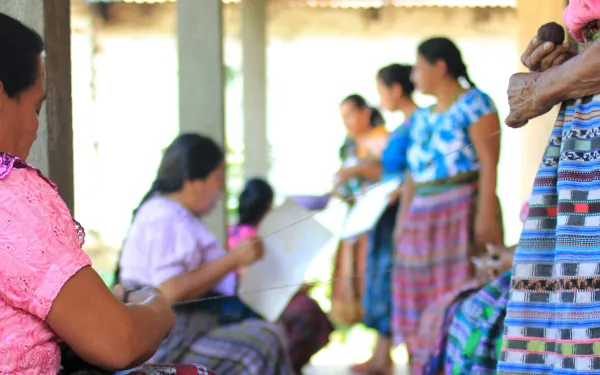
"Portraits of a feminist energy transition"
The energy transition is essential and underway, but what are the risks and opportunities that the green energy revolution represents for the realisation of women's rights? How can we prevent the replication of extractive practices commonly associated with fossil industries? How can we promote renewable energy models that promote women's participation and the eradication of energy poverty? The series "Portraits of a Feminist Energy Transition" seeks to showcase the stories of women activists and human rights defenders advcating for a just energy transition. A new energy system that protects the environment, advances gender equality and provides safe, affordable and sustainable access to energy. Although women play a critical role in the management and use of energy resources in households and their communities, they face common challenges linked to systemic discrimination, energy poverty and lack of representation in the development of the new renewable energy sector. We cannot accelerate the move towards sustainable energy systems without bringing to the centre the voices of women and communities who have historically been left behind in energy decision-making spaces. In the context of COP26 and when discussing an energy transition that involves an unprecedented technical and technological shift from one source of energy to another and counteracting the effects of climate change, the civil society organisations, Global Initiative for Economic, Social and Cultural Rights (GI-ESCR) and the Interamerican Association for Environmental Defense (AIDA), with the support of FES-Geneva, launch the first video in the series that tells the story of Maria, an indigenous woman from the Maya Chuj ethnic group living in the Yich K'isis micro-region of Guatemala. It is only through women's stories and experiences that we can reduce the potential risks of the energy transition and catalyse the transformative power of renewable energy to advance gender equality and a low carbon future for all. Listen to María’s story!
Read more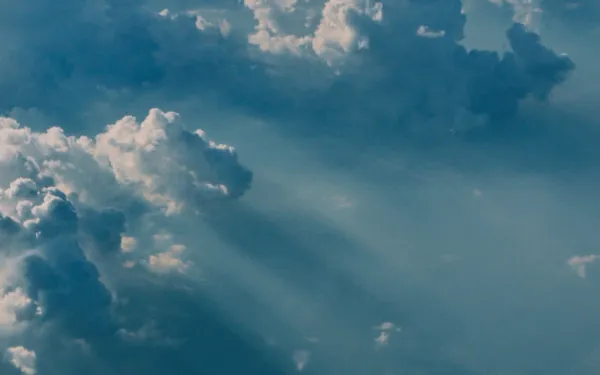
Science's call to action for climate and air
By Fabio López Alfaro y Luisa Gaona Quiroga, AIDA interns The first installment of the Intergovernmental Panel on Climate Change’s (IPCC) Sixth Assessment Report—which will be completed in 2022—devotes an unprecedented entire chapter to short-lived climate pollutants (SLCPs), the reduction of which can mitigate the climate crisis and improve air quality. The IPCC's emphasis on these pollutants reaffirms the intrinsic relationship between climate and air, as well as the urgent need to implement effective and joint measures for their protection. SLCPs are compounds that absorb or reflect solar energy. They have the capacity to heat or cool the Earth on short time scales (days to years), in contrast to greenhouse gases, such as carbon dioxide, whose climate impact can last decades, centuries or even longer. The best-known SLCPs include black carbon (small particles produced by burning diesel, biofuels and biomass), methane (which has a high global warming effect and is a precursor of other pollutants), tropospheric ozone and hydrofluorocarbons. Because they remain in the atmosphere for only short periods of time, their impacts on climate are regional and their changes are linked to changes in their emission sources. Although some SLCPs warm the planet and others cool it, the fact is that these pollutants cause between 30 and 45 percent of global warming, in addition to damaging air quality and affecting crop yields. Therefore, their integral management is decisive for mitigating the climate crisis and improving our quality of life. The situation in Latin America In this IPCC assessment cycle, the availability of information made it possible to emphasize the regional analysis of climate change, illustrating the relevance of SLCPs, whose impacts on climate and air are primarily local. However, the findings for Latin America are minor compared to those of Europe, Asia or North America, evidencing a lag in the region's knowledge. Closing this knowledge gap on SLCPs is fundamental because the region ranks third in terms of short-term (10 year) warming generation, surpassed by East Asia and North America. Despite having less information, the IPCC was able to identify the key sectors and pollutants to manage in Latin America. The report highlights that mitigation policies should focus on particulate matter and ozone generated in industry, energy production and open burning of biomass, sectors that are regionally responsible for the highest emissions. As the diameter of the particulate matter decreases, the negative health impacts are greater. Thus, fine particles— of particulate matter 2.5—cause the most harmful impacts on people's respiratory and cardiovascular systems. According to the World Health Organization, black carbon and organic carbon form a substantial part of particulate matter in air pollution, and are an important cause of morbidity and premature mortality worldwide. Moreover, methane and black carbon are the primary pollutants of concern in agriculture, fossil fuels, waste management and diesel engines, sectors that are projected to contribute 90 percent of non-OECD countries' black carbon emissions by 2100. Call to action The scientific evidence presented by the IPCC is also a call to action, a joint fight for climate and air. The report proves that it is vital to have crosscutting public policies that simultaneously seek to mitigate the climate crisis and SLCP emissions. The absence of such policies, coupled with weak air pollution control, implies short-term warming for Latin America, mainly because it is estimated that emissions of methane, ozone and hydrofluorocarbons—compounds characterized by high warming rates—will increase, as well as lower contributions from aerosols, which would decrease the cooling effect. However, with proper monitoring and in scenarios that combine efforts to reduce GHGs and SLCPs, high climate benefits and stabilization are expected after 2040. Although the climate results of these measures will be visible in 20 to 30 years, they will contribute to improving air quality and protecting human health in the short term. Public policies that work to lessen air pollution can reduce mortality rates due to poor air quality and contribute to meeting several of the Sustainable Development Goals (SDGs), especially those targets related to particulate matter exposure (targets 3.9 and 11.6), human health and cities (targets 3.8 and 11.7), and the health of people and the environment (targets 3.9 and 11.7). They can also contribute to access to clean and affordable energy, responsible consumption and production, climate action and biodiversity protection (SDGs 7, 12, 13, 14 and 15). Finally, reducing CCVC emissions will help reduce crop losses, contributing to achieving zero hunger (SDG 2). Now that we know the sectors and pollutants whose management will be key in the coming years, it is time to demand that authorities and companies implement concrete actions to reduce emissions of SLCPs and obtain co-benefits in the fight for climate and clean air.
Read more